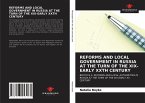Please note that the content of this book primarily consists of articles available from Wikipedia or other free sources online. Turn of the century, in its broadest sense, refers to the transition from one century to another. The term is most often used to indicate a non-specific time period either before or after the beginning of a century - for instance, if a statement describes an event as taking place "at the turn of the 18th century", this means it took place somewhere around the year 1701. Where no specific century is stated, the term usually refers to the transition from the 19th century into the 20th century (1890-1914): a novel referring to "turn of the century England," indicates England, circa 1900. According to the Chicago Manual of Style, however, there is no common agreement about the term. That is, "turn of the nineteenth century" could also mean the turn from the nineteenth into the twentieth century. As such, they recommend using the phrase "turn of the century" and making clear which transition you are talking about.
Bitte wählen Sie Ihr Anliegen aus.
Rechnungen
Retourenschein anfordern
Bestellstatus
Storno








